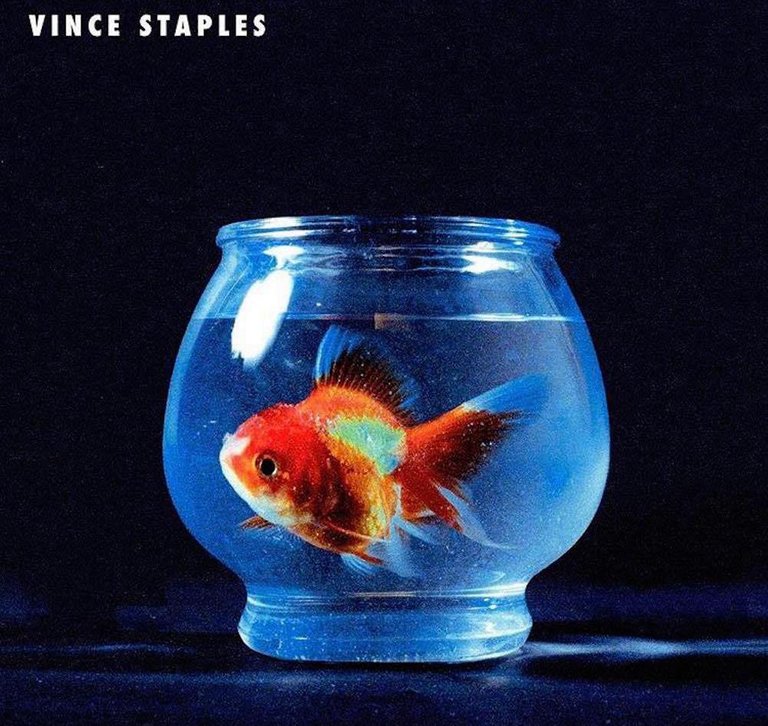
What I listened with: Wireless Bluetooth Speaker
Editor Rating: 8.25/10
The Bottom Line: I love that we finally got some music never heard of in recent years. Although, the sales won’t match this album will last longer than the Grateful album released the same day as Big Fish Theory
The music from Vince Staples embodies numerous adjectives like: annoying, confounding, inspiring or entertaining if you keep an open mind. Vince Staples’ equally swift wit and intellect have made him music’s most charming unheard personality. He’s branded himself almost as an outsider, removed outsider from rap’s shenanigans while exuding the charisma required of a class clown. Vince Staples is like the kid in your high school who gets nominated for homecoming king, but doesn’t play sports. On the intro to his sophomore studio LP Big Fish Theory he punches you in the face the same way Childish Gambino did last year, but I will admit Vince isn’t quite on the talent level of Childish Gambino(but nobody is). Every song is erratic and noisy departure from anything remotely reflecting his well-documented past as a gangbanger.
The first thing that jumps out about Big Fish Theory is the bass. It radiates through your body like biting on something with a tooth that has an exposed nerve. So much so, that it is, at times, hard to make out what Staples is saying. On repeat listens, it becomes difficult to tell whether this is an engineering flaw or if Staples doesn’t think his voice is any more important than a snare or a bassline.
Vince is never known to attempt the same musical ideas twice (with this being his seventh project in under six years), Vince Staples subtly uses the element of surprise to keep listeners on their toes. Pulling inspiration from Amy Winehouse’s predisposal to self-destructive habits, he earnestly sings his way through emotional despair on the “Alyssa” interlude before letting Ray J handle background vocals on “Love Can Be…” (a certain callback to the hijinks surrounding Staples’ previously stated fandom). Here our story’s lead navigates the world of groupies addicted to the nightlife, once again separating himself from the average rap success story by taking a firm stance against money-grubbers who might view his limelight as a quick opportunistic come up.
While Vince sticks with his most familiar narrative examining stardom’s futility despite it providing escape from former life’s struggles, his calling lies in finding provocative, edgy and unconventional ways to tell his story. Luckily, Staples’ choice to walk the road less traveled placing innovation at a premium over fame shouldn’t prevent his well-deserved shine from gaining continual momentum.
The most accessible song on the album (“Big Fish”) features a Juicy J hook about counting hundreds of thousands of dollars but also a reference to suicide. “Party People” takes that brief thought on suicide from an otherwise straightforward single and zooms in uncomfortably close. We eavesdrop on his inner monologue while he sits in first class aboard a plane and contemplates taking his own life and all the “problems [his] cash can’t help.”
Big Fish Theory is not all doom and gloom, though. The Kendrick Lamar-featuring “Yeah Right” finds Vince’s wry wit on display for two short verses before a beat drop becomes a big, fat, fastball over home plate for K. Dot to smack into the upper deck. “BagBak” is defiant, energetic, mosh pit music. “Rain Come Down”, featuring Ty Dolla $ign, finds Staples sounding hyper confident, if not happy.
Hip-hop heads may not be as happy with Big Fish Theory, however. The production is inspired by Detroit techno and house and may be difficult for traditionalists to stomach. Trading in No ID for Zack Sekoff as primary producer might be jarring for some fans. That said, Big Fish is still very much a hip-hop album. One that alludes to sounds invented by black artists, but are now no longer associated with black people. It also alludes to another novel and important idea: What Vince Staples has to say in his music is more important than what he has to say in his interviews.
Our favorite song off the album: